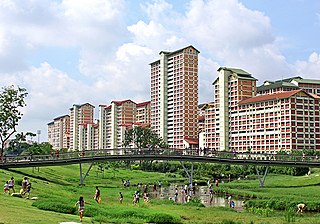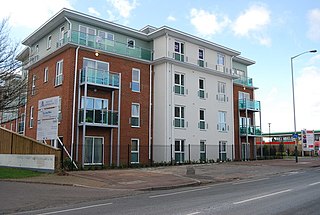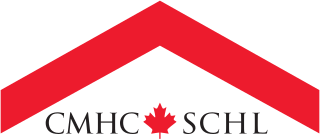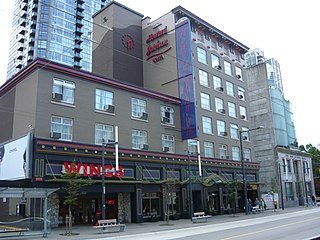Related Research Articles

Public housing is a form of housing tenure in which the property is usually owned by a government authority, either central or local. Although the common goal of public housing is to provide affordable housing, the details, terminology, definitions of poverty, and other criteria for allocation vary within different contexts.

A credit union is a member-owned nonprofit cooperative financial institution.

In Ireland and the United Kingdom, housing associations are private, non-profit making organisations that provide low-cost "social housing" for people in need of a home. Any budget surplus is used to maintain existing housing and to help finance new homes and it cannot be used for personal benefit of directors or shareholders. Although independent, they are regulated by the state and commonly receive public funding. They are now the United Kingdom's major providers of new housing for rent, while many also run shared ownership schemes to help those who cannot afford to buy a home outright.

A housing cooperative, or housing co-op, is a legal entity, usually a cooperative or a corporation, which owns real estate, consisting of one or more residential buildings; it is one type of housing tenure. Typically housing cooperatives are owned by shareholders but in some cases they can be owned by a non-profit organization. They are a distinctive form of home ownership that have many characteristics that differ from other residential arrangements such as single family home ownership, condominiums and renting.

Canada Mortgage and Housing Corporation is Canada's federal crown corporation responsible for administering the National Housing Act, with the mandate to improve housing by living conditions in the country.

Land Bank of the Philippines, is a government-owned bank in the Philippines with a special focus on serving the needs of farmers and fishermen. While it provides the services of a universal bank, it is officially classified as a "specialized government bank" with a universal banking license.
Subsidized housing is government sponsored economic assistance aimed towards alleviating housing costs and expenses for impoverished people with low to moderate incomes. In the United States, subsidized housing is often called "affordable housing". Forms of subsidies include direct housing subsidies, non-profit housing, public housing, rent supplements/vouchers, and some forms of co-operative and private sector housing. According to some sources, increasing access to housing may contribute to lower poverty rates.

Alterna Savings and Credit Union Limited, commonly called Alterna Savings, is a credit union based in Ottawa, Ontario, Canada. In addition to its credit union branches in Ontario, it also operates across Canada through its direct banking subsidiary Alterna Bank.

Toronto Community Housing Corporation (TCHC) is a public housing agency in Toronto, Ontario. It is the largest social housing provider in Canada with over 58,000 units across 2,100 buildings and approximately 105,000 residents. It is the second-largest housing provider in North America, behind the New York City Housing Authority.
The Financial Consumer Agency of Canada is an agency of the Government of Canada that enforces consumer protection legislation, regulations and industry commitments by federally regulated financial entities. It also provides programs and information to help consumers understand their rights and responsibilities when dealing with financial institutions and promotes financial literacy.
Crown corporations in Canada are government organizations with a mixture of commercial and public-policy objectives. They are directly and wholly owned by the Crown.
Public auto insurance is a government-owned and -operated system of compulsory automobile insurance used in the Canadian provinces of British Columbia, Saskatchewan, Manitoba, and Quebec. It is based on the idea that if motorists are compelled to purchase auto insurance by the government, the government ought to ensure motorists pay fair premiums and receive high-quality coverage. Governments across the country have used various insurance schemes from full tort to full no-fault in pursuit of that goal.
Public housing policies in Canada includes rent controls, as well as subsidized interest rates and grants. Early public housing policy in Canada consisted of public-private lending schemes which focused on expanding home ownership among the middle class. The first major housing initiative in Canada was the Dominion Housing Act of 1935, which increased the amount of credit available for mortgage loans.
The Haldimand-Norfolk Housing Corporation is a social housing organization providing rental housing for senior citizens, adults, and families.
A health insurance cooperative is a cooperative entity that has the goal of providing health insurance and is also owned by the people that the organization insures. It is a form of mutual insurance.
Non-profit housing developers build affordable housing for individuals under-served by the private market. The non-profit housing sector is composed of community development corporations (CDC) and national and regional non-profit housing organizations whose mission is to provide for the needy, the elderly, working households, and others that the private housing market does not adequately serve. Of the total 4.6 million units in the social housing sector, non-profit developers have produced approximately 1.547 million units, or roughly one-third of the total stock. Since non-profit developers seldom have the financial resources or access to capital that for-profit entities do, they often use multiple layers of financing, usually from a variety of sources for both development and operation of these affordable housing units.

Affordable housing in Canada is living spaces that are deemed financially accessible to those with a median household income in Canada. The property ladder continuum of affordable housing in Canada includes market, non-market, and government-subsidized housing.

Bajaj Finserv Limited is an Indian non-banking financial services company headquartered in Pune. It is focused on lending, asset management, wealth management and insurance.

One in eight Canadian households lived in a residential condominium dwellings, mostly located in a few census metropolitan areas according to Statistics Canada Condominiums exist throughout Canada, although condominiums are most frequently found in the larger cities. "Condominium" is a legal term used in most provinces of Canada. in British Columbia, it is referred to as "strata title" and in Quebec, the term "divided co-property" is used, although the colloquial name remains "condominium".

Affordable housing is housing that is deemed affordable to those with a median household income as rated by the national government or a local government by a recognized housing affordability index. A general rule is no more than 30% of gross monthly income should be spent on housing, to be considered affordable as the challenges of promoting affordable housing varies by location.
References
- ↑ "Law Document English View". 24 July 2014.
- ↑ "Non-Profit Housing – Capital Reserves" (PDF). Ministry of Municipal Affairs and Housing . 2 November 1999. Archived (PDF) from the original on 6 April 2023. Retrieved 3 July 2023.
- ↑ "Cooperative Housing Federation of Canada". chfcanada.coop. Archived from the original on 7 June 2023. Retrieved 3 July 2023.
- ↑ "Cooperative Housing Federation of British Columbia". www.chf.bc.ca. Archived from the original on 14 June 2023. Retrieved 2 July 2023.
- ↑ "Social Housing Organization BC". bcnpha.ca. Archived from the original on 29 June 2023. Retrieved 1 July 2023.
- ↑ "About Us". Encasa Financial.